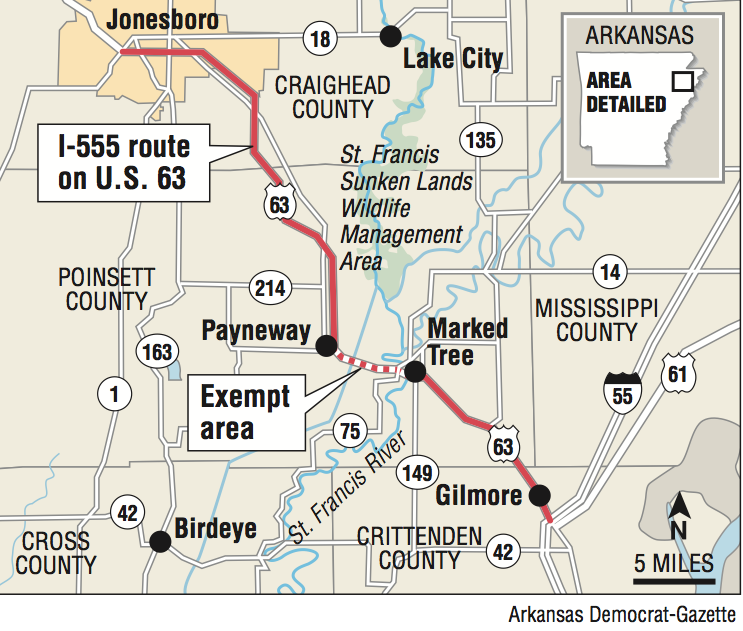The new federal highway bill clears the way for U.S. 63, also known as Future I-555, in northeast Arkansas finally to be designated Interstate 555. The designation is possible now because a provision in the bill allows farm equipment on a 5-mile section of the highway so farmers can access their fields.
Farm equipment is normally prohibited on interstates, but in this case, the roadway is in an area dominated by agriculture and runs through some ecologically sensitive wetlands.
For years now, the farm-equipment prohibition has held up the I-555 designation for the 58.21-mile stretch of the highway between U.S. 49 in Jonesboro and Interstate 55 near Turrell.
A proposal to add a frontage road along U.S. 63 at a cost of $30 million was deemed too expensive. A factor in its cost was that the road would require a bridge across the sensitive wetlands.
Arkansas highway officials credited members of the state's congressional delegation -- including U.S. Rep. Rick Crawford and U.S. Sen. John Boozman, both Republicans -- for fashioning the farm-equipment exemption.
Also, as part of the effort, the state passed a law granting a similar exemption on roads it oversees.
Crawford was a member of the conference committee that crafted the five-year, $281 billion federal transportation bill, which President Barack Obama has said he will sign, if Congress passes it.
"The actions of Congressman Crawford, Sen. Boozman, Gov. [Asa] Hutchinson, and our General Assembly allowed a major highway improvement to occur that has a huge impact economically for the region at no cost to the taxpayers, actually saving more than $30 million," said Alec Farmer of Jonesboro, a member of the Arkansas Highway Commission.
The provision in the highway bill would end the route's designation as Future I-555, a tag it has carried for almost 15 years.
The interstate designation stalled over a section between Payneway and Marked Tree in Poinsett County. U.S. 63 crosses the southern portion of the St. Francis Sunken Lands Wildlife Management Area, a 26,000-acre "island" of bottomland and hardwood forest. The "sunken lands" resulted from the New Madrid earthquakes of 1811 and 1812.
Also, within the 5 miles is a floodway, a flat area adjacent to the St. Francis River that is prone to flooding.
With no other crossing nearby, farmers use that section of U.S. 63 to drive their harvests to Marked Tree cotton gins, warehouses and grain elevators.
If U.S. 63 were designated as an interstate without the farm-equipment exemption, farmers would no longer be able to use any part of it for trucking their crops.
Federal law bans farm vehicles, such as cotton-module trucks, from interstates because of their size, the number of axles and the spacing between the axles.
For farm vehicles to cross the flood plain elsewhere would require farmers to take circuitous routes up to Lake City in Craighead County to the north and back down, or almost to Birdeye in Cross County to the south and back up. Both routes would add 90 miles to a trip.
Economic boosters in Jonesboro have long considered the lack of the interstate designation as an unfulfilled promise that they had made to attract several companies to the city and surrounding region. Those companies include Nestle USA, Quad/Graphics Inc., Frito-Lay Inc., Hytrol Conveyor Co. and Riceland Foods, which together employ more than 2,000 people.
"It's been a long time coming," said Fritz Gisler, communications director for the city of Jonesboro. "We're very, very excited and happy to finally see it happen.
"It's going to be a very good thing for the city, both economically and for development."
Mark Young, president and chief executive officer of the Jonesboro Chamber of Commerce, also welcomed news that the interstate designation may be finally coming.
"It's extremely important to receive the designation of Interstate 555," Young said. "One of the first things [companies] ask about is whether we have access to an interstate. It will be great to have an opportunity to have that official designation."
Officials at the Arkansas Highway and Transportation Department expressed relief that a compromise was found to appease economic development boosters and the area's farmers.
"We are extremely happy that we can see I-555 becoming a new reality, especially without taking additional time and additional funding," said Scott Bennett, the department director. "This has been an important, concerted effort by federal, state and local officials -- as well as stakeholders -- to come up with the best overall solution for economic development that includes the agricultural industry which is so important to our state."
Major improvements to U.S. 63 began in the early 1970s in the form of a Jonesboro bypass project. During the past 40 years, more than $250 million was spent to get the highway up to interstate quality, the department said.
The department said that as part of its mandate to protect motorists, it will review safety protocols for the section of roadway.
"We will have to have federal highway approval, but everything is good," Bennett told the commission at its meeting Wednesday in Little Rock. "It's an interstate, a quality road, and the exemptions are in place and once they give us the approval, we can put up the signs."
Metro on 12/03/2015

